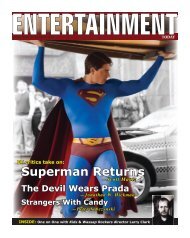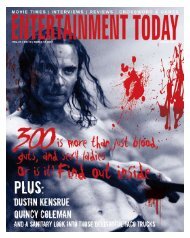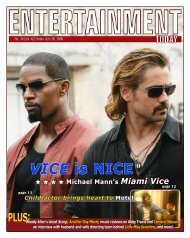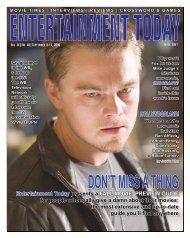LOVE
this issue of Entertainment Today
this issue of Entertainment Today
You also want an ePaper? Increase the reach of your titles
YUMPU automatically turns print PDFs into web optimized ePapers that Google loves.
y Mathew Klickstein<br />
Andy Warhol was a self-proclaimed<br />
commercial artist. And<br />
why not? Why lie? No matter how<br />
polemic, subversive, or artsy-fartsy<br />
a piece of artistic expression might<br />
be, if you’re trying to get it out to<br />
the public, if you’re trying to at least<br />
make your money back, you are a<br />
commercial artist. Otherwise, why<br />
not just produce shit that you can<br />
exhibit in your garage to family and<br />
friends?<br />
Another “Andy” is Mr. Andrew<br />
Bujalski, a filmmaker and long-time<br />
friend of a friend of mine. I may<br />
affectionately call him “Bujarsky,”<br />
but Variety calls him a combination<br />
of John Cassavetes and Eric Rohmer.<br />
See his films, and you might end up<br />
calling him America’s last hope for<br />
truly independent cinema.<br />
“I’m not making films for a mass<br />
audience,” says Bujalski who looks a<br />
bit like a squiggly caricature of the<br />
kind of nerdy “punk” kid you thought<br />
you’d left behind in high school with<br />
his black Converse shoes, flannel<br />
shirt, jeans, messy hair, ever-present<br />
uncomfortable smile, and slight sheen<br />
of a lifelong struggle with facial<br />
acne. He can be seen in both of his<br />
films: Funny Ha Ha and the recently<br />
released Mutual Appreciation.<br />
“The films that mean the most<br />
to me are those that gave me my<br />
own personal experience in watching<br />
them.” Bujalski<br />
admits that whereas<br />
he’s capable of<br />
enjoying a “massive”<br />
experience<br />
in a theater—as<br />
he had when he<br />
saw There’s Something<br />
About Mary<br />
on opening night<br />
with a huge crowd<br />
(“It was a really<br />
great feeling to<br />
be laughing and<br />
sharing this communal<br />
sense with<br />
such a large group<br />
of people in the<br />
theater”)—but this<br />
filmmaker makes<br />
movies that he<br />
hopes will give people varied and<br />
individual reactions, as with those he<br />
himself has enjoyed in the past.<br />
Sure, he wants people to see his<br />
movies. But this doesn’t seem to be<br />
his main concern. Nonetheless, after<br />
numerous lauds for his inaugural<br />
Funny Ha Ha (that earned him a<br />
Someone to Watch Award at the<br />
2004 Independent Spirit Awards),<br />
his movies are definitely being seen…<br />
especially Mutual Appreciation, a film<br />
that came to Los Angeles theaters<br />
last week.<br />
Bujalski doesn’t simply seem<br />
unfazed by his modest commercial<br />
success and his slightly-more-thanmodest<br />
critical success, he truly is<br />
exactly the same guy I knew when he<br />
slept on my friend’s couch and told<br />
us that between gigs as a substitute<br />
teacher in Boston, he was editing his<br />
new film.<br />
Yeah, he’s a little more interested<br />
in the pecuniary facets of the filmmaking<br />
process these days—at one<br />
point in our intimate colloquy over<br />
hot drinks and a shared brownie<br />
at the Laemmle Sunset 5’s Buzz<br />
Coffee, I asked him about how he<br />
met his actors, and as he answered,<br />
he suddenly asked, “By the way, was<br />
there anyone in the theater?” anent<br />
my having just seen the movie a<br />
few minutes earlier. It was such an<br />
awkward interposition that at first I<br />
thought he was still answering my<br />
question.<br />
In fact, when Bujalski shot the<br />
first scenes of Mutual back in October<br />
’03, Funny Ha Ha—though by then in<br />
the can and on the festival circuit for<br />
quite some time—hadn’t really hit its<br />
theatrical apex until 2005 (the date<br />
Bujalski distinguishes as “the film’s<br />
actual release.”) “We were still pretty<br />
Andrew Bujalski is the mastermind behind Funny Ha Ha and Mutual Appreciation.<br />
naïve when we were making Mutual.<br />
We were basically living in the same<br />
vacuum as when we made Funny Ha<br />
Ha,” confirms the writer-director who<br />
claims, without a shred of defensive<br />
reasoning, that in a perverse way, the<br />
fact that his first film didn’t render<br />
too much in the way of profits or<br />
mainstream recognition allowed him<br />
to make another film under the same<br />
ascetic and authentic auspices.<br />
And “authentic,” Mutual Appreciation<br />
certainly could be best described.<br />
The characters are so earnest and<br />
sincere that I couldn’t shake this odd,<br />
elegiac sense of déjà vu every time<br />
another one was introduced. Heck,<br />
I really do think I remember meeting<br />
the adorably cherubic Rachel Clift<br />
(Ellie) from some forgotten longago<br />
camp experience or some such<br />
nonsense. After the band session in<br />
the film, I caught myself—by sheer<br />
reflex—putting my hands together<br />
to clap…until I quickly realized<br />
that I was in a dark, moderately<br />
populated movie theater, not a hep<br />
Williamsburg bar. During a scene<br />
with that “old friend of mine” Ms.<br />
Clift when—under extremely awkward<br />
circumstances—she tells her<br />
boyfriend with a tremulous waver, “I<br />
love you,” over the phone, I became<br />
misty-eyed at the notion that a girl<br />
hasn’t said those magic words to me<br />
and meant it since high school.<br />
This movie hits hard on a visceral<br />
level because, unlike the more popular<br />
flavor of disconnected young adults<br />
in liminality, Bujalski does not haphazardly<br />
construct sycophantically<br />
derivative films mired in maudlin<br />
sentimentality—rather, he recreates<br />
life. The actors are so (almost<br />
unnervingly) veracious, that one<br />
almost expects them to look at the<br />
camera. Please don’t misunderstand:<br />
these are not your friends from film<br />
class muttering<br />
lines with softvoiced<br />
insouciance.<br />
They’re<br />
simply so (at<br />
times painfully)<br />
truthful in their<br />
stunning performances—a<br />
testament to<br />
Bujalski’s exemplary<br />
direction,<br />
being that the<br />
s a m e c o u l d<br />
be said about<br />
his f reshman<br />
effort—that if<br />
the Academy<br />
Awards were<br />
based on sheer<br />
merit as opposed<br />
to PR/marketing, the entire cast of<br />
Mutual Appreciation would be up for<br />
some big nods this year.<br />
“All acting is an improvisation,”<br />
asserts Bujalski when I ask him the<br />
obvious question of how much of his<br />
see BUJALSKI on p.26<br />
|19|<br />
Originally directed by Christopher Reeve, Everyone’s Hero has a lot of heart, but little else.<br />
EVERYONE’S HERO<br />
(2 out of 4 stars)<br />
Directed by Colin Brady,<br />
Christopher Reeve, Dan St. Pierre<br />
Starring: Jake T. Austin,<br />
Cherise Boothe, Brian Dennehy,<br />
Whoopi Goldberg, Ed Helms<br />
85 minutes, Rated G<br />
by Steven Snyder<br />
What feels even more superficial<br />
than Everyone’s Hero’s computer<br />
animation is its affection for the<br />
game of baseball—a game that<br />
today seems less like America’s<br />
favorite pastime than a league<br />
riddled by scandals, subpoenas,<br />
and steroids.<br />
Remove the 3-D effects—that<br />
are not really required nor appreciated<br />
here—and this is a movie that<br />
could have been made in the 1940’s<br />
or 1950’s. And while nostalgia can<br />
at times be a delightful thing, Hero<br />
tries to sell its wares a little too<br />
hard, and leaves us wondering if<br />
its makers really buy all this sappiness…because<br />
we sure can’t.<br />
It’s a story ripped from the<br />
pages of baseball history. Babe<br />
Ruth plays ball in the World Series,<br />
and a young boy named Yankee<br />
(voiced by Jake T. Austin) is the<br />
only one who can identify the<br />
burglar of the Babe’s famous bat (a<br />
good rule of thumb, kids: never trust<br />
a relief pitcher). Yankee sets out to<br />
get the bat back to Babe in hopes<br />
that the Great Bambino wins the<br />
World Series. In so doing, Yankee<br />
hopes his dad, who’s been blamed<br />
for the theft, gets his job back.<br />
Now, it almost feels meanspirited<br />
to criticize a film with<br />
such sweet and simple aspirations—not<br />
to mention that it was<br />
partly the brain-child of the late,<br />
great Christopher “Superman”<br />
Reeve who shares a directing credit<br />
with Colin Brady and Dan St.<br />
Pierre. But, there’s a difference<br />
between something that’s sweet and<br />
something that’s syrupy, and here’s<br />
a film that is far too self-aware to<br />
ever quite break through the wall<br />
that divides movie screen from<br />
movie audience.<br />
For starters, the film seems to<br />
be animated for no other reason<br />
than to allow Yankee to have conversations<br />
with a talking baseball<br />
and a talking bat. But since the<br />
story revolves around real human<br />
beings—real kids, parents, and<br />
ball players—the animation serves<br />
as a major distraction not just in<br />
terms of characters, but in terms<br />
of dialogue and story.<br />
In this way, it’s yet another<br />
big-budget animated comedy<br />
that feels disconnected from its<br />
story—unwisely using computers<br />
to replicate reality while ignoring<br />
the fact that the best moments of<br />
animated cinema have been those<br />
which have embraced the surrealism<br />
animation makes possible.<br />
Hero gives us another parade<br />
of realistic characters, all voiced<br />
to perfection by the likes of Brian<br />
Dennehy (the Babe) and Ed Helms<br />
(the thieving pitcher), who interact<br />
awkwardly and rigidly.<br />
The technical debate aside,<br />
Everyone’s Hero suffers from being<br />
an incomplete concept. Early on,<br />
the genuine terror Yankee feels<br />
when he realizes that he might have<br />
cost his dad his job is an intriguing<br />
theme. And later, when Yankee<br />
debates whether he should head<br />
back to the comfort of home or<br />
venture on to Chicago alone, and<br />
when he hitches a ride on the bus<br />
of a team in the Negro League, the<br />
film promises an interesting discussion<br />
it never quite delivers.<br />
This is a one-note, light-hearted<br />
see HERO on p.27<br />
SEPTEMBER 15-21, 2006 ENTERTAINMENT TODAY














